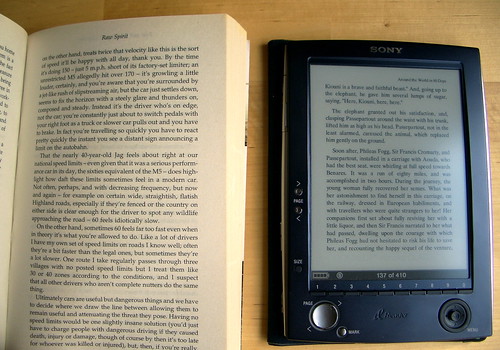Whenever I do a talk about ebooks I pretty much always hear people saying that they don't feel that ebooks are the same, that you get something different from the look and feel of a paper printed book (and other things like the smell of a book). I agree with a lot of those things too, and I'm also sure that the feel and smell of the horse was different from the car, but both got people from place to place, but for the most part only one is really in use as standard transportation today. The difference between reading from a text is printed on paper and reading from etext on the ereader has now been solved, there is no difference. Researchers in Germany have found that there was no difference when scanning peoples brains as they read from paper than has a red from the and the reader. The the study analyzed differences in reading from different kinds of books digital ink tablet PC and printed paper. The reading behavior of the readers was analyzed through eye movement (eye tracking) and electrophysiological brain activity (EEG). Things that they were looking for were changes in the data frequency band reading behavior, text comprehension, and information recall as well as participants preferences. One interesting side note that they did find, was that older readers actually read faster using iPad and they did when reading from paper printed text, and that information was actually processed more easily on a tablet.
>>>>>>>>>>>>>>>>>>>>>>>>>>>>>>>>>>
Study showed that there was no difference in terms of reading performance between reading from paper and from an e-ink reader. "We have thus demonstrated that the subjective preference for the printed book is not an indicator of how fast and how well the information is processed," concludes Professor Schlesewsky. 10/20/2011
http://www.uni-mainz.de/eng/14685.php
>>>>>>>>>>>>>>>>>>>>>>>>>>>>>>>>>>
Study showed that there was no difference in terms of reading performance between reading from paper and from an e-ink reader. "We have thus demonstrated that the subjective preference for the printed book is not an indicator of how fast and how well the information is processed," concludes Professor Schlesewsky. 10/20/2011
http://www.uni-mainz.de/eng/14685.php

Comments
Post a Comment